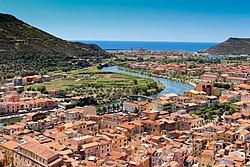Bosa is a town and comune in the province of Oristano (until May 2005 it was in the province of Nuoro), part of the Sardinia region of Italy. Bosa is situated about two-thirds of the way up the west coast of Sardinia, on a small hill, about 3 kilometres (2 miles) inland on the north bank of the Temo River. The town has maintained a population of around 8,000 people for a significant amount of time, but has an urban character that has differentiated it from other locations in Sardinia. It is one of I Borghi più belli d'Italia ("The most beautiful villages of Italy").[3] Agriculture and fishing play an important part in the city economy, thanks to the river valley near the coast surrounded by hills and highland plateaus.
Bosa | |
|---|---|
| Comune di Bosa | |
 view of Bosa from the Serravalle's Castle | |
| Coordinates: 40°18′N 8°30′E / 40.300°N 8.500°E | |
| Country | Italy |
| Region | Sardinia |
| Province | Oristano (OR) |
| Frazioni | Bosa Marina |
| Government | |
| • Mayor | Piero Franco Casula |
| Area | |
• Total | 135.67 km2 (52.38 sq mi) |
| Elevation | 2 m (7 ft) |
| Population (1 January 2009)[2] | |
• Total | 8,126 |
| • Density | 60/km2 (160/sq mi) |
| Demonym(s) | Bosani Bosincos |
| Time zone | UTC+1 (CET) |
| • Summer (DST) | UTC+2 (CEST) |
| Postal code | 09089 |
| Dialing code | 0785 |
| ISTAT code | 095079 |
| Patron saint | St. Emilius and Priamus |
| Saint day | May 28 |
| Website | Official website |



History
editThe area was inhabited since prehistorical times, as attested by the presence of several domus de janas and nuraghe. It was probably founded by the Phoenicians, although little is known about the original settlement. Under the Romans it was a municipium. The present town of Bosa was founded in 13th century by the Malaspina family, 2.5 km (1.5 miles) from the site of the ancient town.[4] In the early Middle Ages, as part of the Giudicato of Logudoro, it was a provincial capital. After the construction of the Malaspina Castle, the population gradually moved from the seaside to the hills.
It remained in the hands of the Malaspina until the 14th century, when it was taken over by the Crown of Aragon. Along with the rest of Sardinia, it was later ruled by Spain. For a short period in between, it was a part of the Giudicato of Arborea.
Bosa is known for a classical way of saying: you do like they do in Bosa: if it rains, they let it rains.
Sources and references
edit- ^ "Superficie di Comuni Province e Regioni italiane al 9 ottobre 2011". Italian National Institute of Statistics. Retrieved 16 March 2019.
- ^ "Popolazione Residente al 1° Gennaio 2018". Italian National Institute of Statistics. Retrieved 16 March 2019.
- ^ "Sardegna" (in Italian). Retrieved 1 August 2023.
- ^ Chisholm, Hugh, ed. (1911). . Encyclopædia Britannica (11th ed.). Cambridge University Press.
External links
edit



